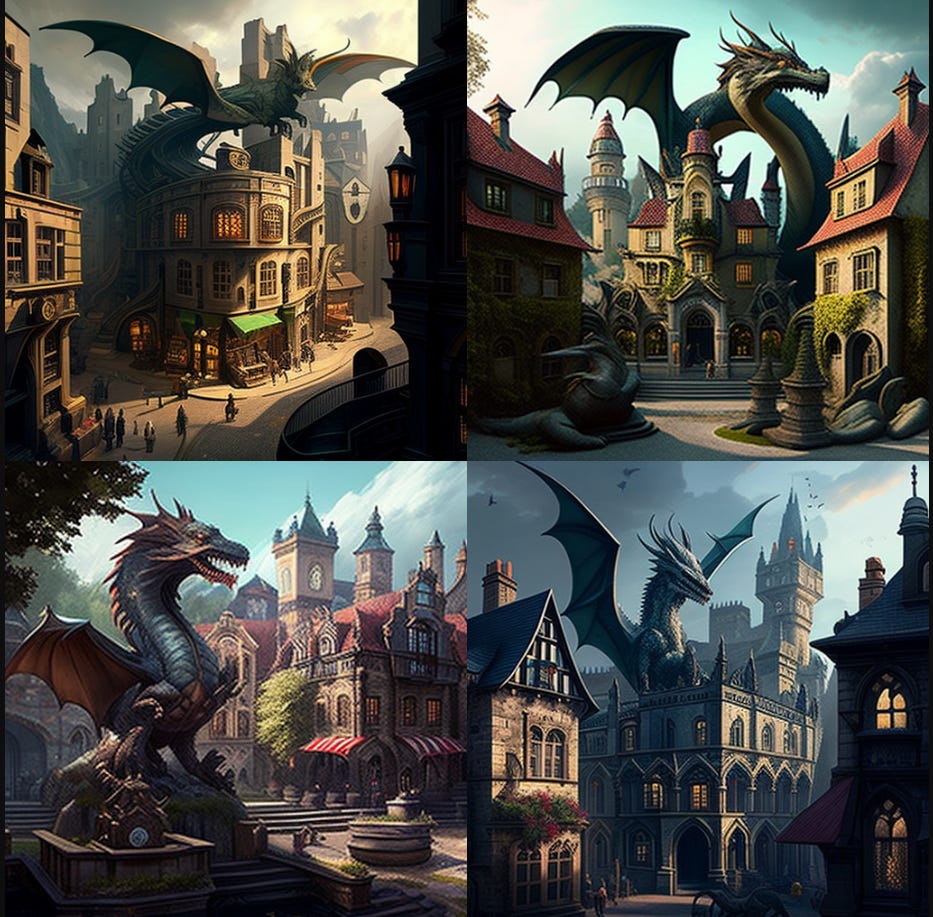Does it matter if AI designs your luxury handbag or high-end apartment building (metaverse or IRL)?
A question of art and utility.
Does it matter if AI designs your luxury handbag or high-end metaverse apartment building?
Anyone who knows me knows I’m long the relationship between blockchain/authenticated distributed digital ownership and the metaverse. And I’m no GenAI denier. It’s incredible what the various consumer platforms entering the scene are already creating, like ChatGPT, Dall-E, Midjourney, and more.
But when I think about digital value, particularly when it comes to goods with an aesthetic value, fashion, architecture, art, etc… I begin to wonder how AI will change our perception of value, both personal value and financial, transaction value. Does a human designer mean more value? Does it make a piece of architecture or a fancy shoe more valuable?
Generative AI is going to change a lot of boring design stuff
I’m currently knee-deep in genAI project, which has given me a lot of time to noodle on the various use cases for AI in a general business setting. No more wasted time formatting PowerPoints; I can spend my time on the crux of the story and how to deliver it. No more googling and putzing about with unfamiliar excel formulas, I can just tell the spreadsheet what I need to know, and it will spit it out. No more painstaking Photoshop work to make minute changes in advertising visuals; the AI will create all the necessary variations.
These examples make it clear where the human value lies, in the creation of the question to be answered: the why, not the how.
How does this differ when the output IS what you're selling? When is translating ideas from inside your head business, and when is it art?
genAI’s power is in its limitlessness- perfect for the (dragon-filled?) metaverses.
An example of GenAI’s creation and creative power is in world-building. Massive 3D immersive worlds will require so many unique physical locations to provide enough environment, and genAI is the obvious solution. “Build me a city with enough space for 300,000 avatars to live, work, socialize, and hunt dragons.” Boom.
(I asked MidJourney for “an art deco city with enough space for 300,000 avatars to live, work, socialize, and hunt dragons, set in the English countryside, with dragons hiding in the far-off forests, in a photorealistic style”)
In this imaginary metropolis, what will have value? Will some buildings be designed with more effort than others, meeting an external level of acceptable or even amazing design? Will the value come from the unseen, like built-in dragon protection? Obviously, the old real estate adage will be even more true. Location Location Location. I presume we will see an apex of value at the intersection of “good” design (whatever that trend is at the moment) and utility.
We don’t know enough about good metaverse design yet
Good architectural design currently means exposing a level of skill in combining the visuals, the materials, and the laws of physics. Until the average user, or architecture critic, is more aware of how the boundaries of 3d design in various immersive worlds force designers to make hard decisions, it’s going to be challenging to understand the value of real design versus AI design.
(I asked MidJourney for “a city block full of apartment buildings designed by the 21st century's premier architects “)
Or do we? Are we all critics AND creators?
Is good design functional just by existing, e.g., in the metaverse, if the building does what a building needs to do, we can then judge it purely based on its aesthetics? Another way to look at this question is by ascribing more value to the human, and opening up the floor to people without formal training. If genAI can make an architect, coder, or fashion designer out of anyone thanks to natural language processing capabilities, maybe we will have to reevaluate the role of some skills in creative output. Already, Ready Player Me, the avatar company, is launching a trial where players can use generative AI to craft their own avatar outfits. The company has said that AI is helpful as it can get people over a barrier where they feel they don’t have the expertise to be creative.
If there’s no designer and there’s no utility, then what?
Hermes just won their lawsuit over an artist's use of "metabirkins" in their digital art. Hermès argued that NFTs were a new product category, and thus subject to their copyright protections, and Maison Rothschild, the artist, argued that there is no such thing as a digital twin.
From Vogue Business "(the case suggests) digital representations of luxury goods have meaningful value even if they don’t perform the original function of, say, carrying one’s belongings or clothing one’s physical body. This communicates that a luxury handbag’s purpose is just as much about cultural status, whether in the physical world or metaverse spaces."
So these digital Birkins have value because of the brand Birkin/Hermes. That I accept wholeheartedly. Does it matter if there’s no human? If you are buying an AI’s riffs off the house’s design codes, enshrined by a few decades of human design work, now left entirely to the robots, will you value that handbag/tee shirt/whatever the same? Asking for a friend.
The old-fashioned part of me thinks, yes, you must have a human designer to charge $40k for a handbag. But the rational, future-thinking part is not so sure.





